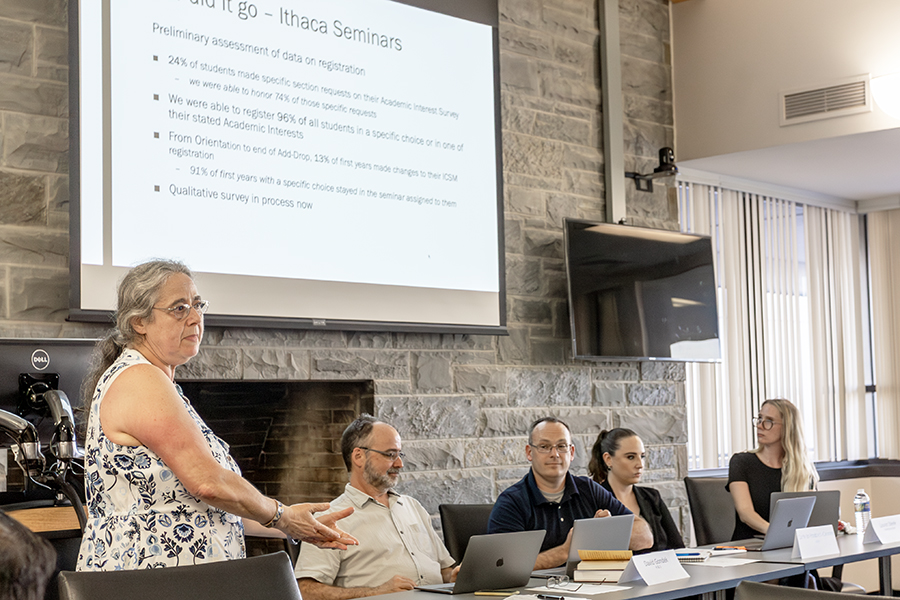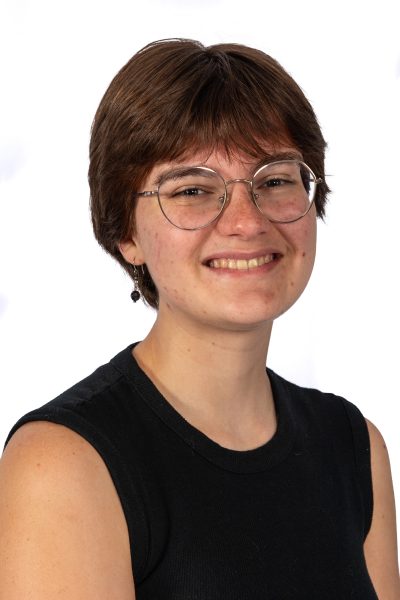The Ithaca College Faculty Council met Oct. 3 to discuss the success of summer academic onboarding through the pre-registration process. It also convened a sub-committee for student statements.
Stacia Zabusky, associate provost of academic programs, said that in summer 2022, the School of Humanities and Sciences ran a pilot program that pre-registered students for classes who were in the exploratory program. The pilot pre-registered 170 first-year exploratory program students for Fall 2022 classes and was implemented for all first-year students for Fall 2023 registration. Zabusky said the registration process was modified from past years for Fall 2023 based on recommendations from the Center for Student Success and Retention.
“I will also say that whatever we do, we’re always going by the 80/20 rule,” Zabusky said. “We are never going to have 100% no problems or everybody’s happy. We’re shooting for how many students and caregivers can we get through this process in a satisfied way.”
Zabusky said the process was modified to the pre-registration model by analyzing factors like how many students were successfully able to register themselves in a seminar in Fall 2022 and also looking at add/drop rates.
“In the spirit of continuous improvement, we said … ‘We’ve got to do it better,’” Zabusky said. “So we revisited the issue of this proposal [to pre-register students].”
Zabusky said students were registered in classes for Fall 2023 through a three-step process. First, the deans’ offices received a list of students who paid their deposit to commit. Then, the Integrative Core Curriculum and Ithaca College Seminar teams registered students into an ICSM of the students’ choice and finally, students were registered into elective classes based on the academic interest survey. The academic interest survey allowed students to indicate their preferences for subjects.
Zabusky said 85% of first-year students submitted the academic interest survey by the deadline and by Aug. 1 — closer to when classes started — 97% had submitted the survey. For ICSM classes, the team was able to honor 74% of all specific academic requests made by students. She said 13% of first-year students made changes to the ICSM they were assigned to and 91% of students chose to stay in the ICSM they were assigned to.
“This is the sort of stuff that happens all the time because it’s just too complicated to get it all right the first time around,” Zabusky said. “[But] we were able to do this without any disruption to the student experience.”
Zabusky said the success of summer academic onboarding could also be measured by monitoring changes to students’ schedules. In Fall 2022, 61% of first-year students made changes to their schedule and in Fall 2023, 41% of first-year students made changes to their schedule.
Zabusky said that by executing the onboarding process, the academic onboarding team is working on improving specific aspects like aligning students’ classes more closely with their interests, as indicated in the academic interest survey and explicitly teaching students how to add and drop classes during orientation.
“Because we were working so fast and so late, we didn’t communicate in a robust way,” Zabusky said. “We were making a lot of decisions on the fly just to get it done. So we’re going to go a lot deeper next year with keeping people in the loop on what’s happening and why it’s happening.”
Ted Galanthay, associate professor in the Department of Mathematics, asked if there were plans to automate the onboarding process in the future.
Zabusky said that automating the process is a long-term goal for the team, which won’t be implemented next summer. However, the team is looking at models of other institutions, like the University of Chicago,in the meantime.
Dennis Charsky, professor in the Department of Strategic Communications and chair of the Communication Management and Design Program, asked if there were processes in place that made students feel confident to register for classes by themselves for Spring 2024.
Zabusky said it was very common for students to forget how to register and there are other resources offered by the Registrar and the Center for Student Success and Retention to help students.
Following the discussion about student registration, Melanie Stein, provost and senior vice president of academic affairs, updated the council about multiple executive searches. Stein said the search for the dean of the School of Health Sciences and Human Performance is in the recruitment phase and will enter the public phase in February 2024. Stein said the searches for the vice president of enrollment management and the vice president of student affairs and campus life are also in their early stages.
Stein encouraged council members to participate in the campus climate survey and also requested members to encourage their students to do the same. The survey will be administered in mid-October and was last conducted in 2016. Stein said the survey will be anonymous, but it would record whether the respondent is a student, staff or faculty member.
“We’re following it longitudinally; we’re asking a lot of the same questions,” Stein said. “So it’s really helpful to have lots of people participating.”
Stein wrapped up her report by pointing out that the college was ranked first place for best undergraduate teaching by U.S. News.
“I just want to say the U.S. News rankings … deserve a fair amount of skepticism,” Stein said. “Nonetheless, it was pretty awesome to get that number one … and it’s thanks to the work of all of the faculty on this campus.”
After the provost’s report, the council convened a sub-committee for student statements. The sub-committee will be responsible for improving the way student statements are collected, engaging more students by increasing response rates and streamlining the process to make it easier for students to submit their statements.
Charsky, Paula Murray Cole, associate professor in the Department of Theatre and Dance Performance, and David Hajjar, assistant professor in the Department of Speech-Language Pathology and Audiology, volunteered to serve on the sub-committee.
Before going into an executive session to convene the committee, Dave Gondek, associate professor in the Department of Biology and chair of Faculty Council, said the sub-committee would collect findings across all schools and then present it to the council.
“The idea is that whatever this committee generates is going to come back to all of us,” Gondek said. “And hopefully, it will actually be an iterative process.”









